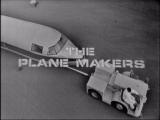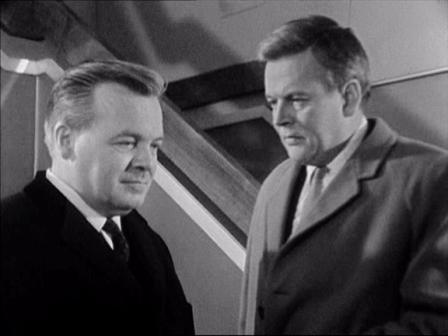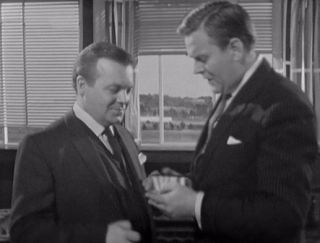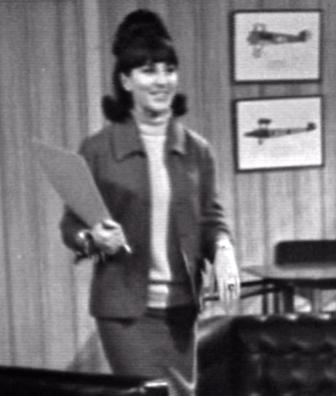
3 December 1963
Strings In Whitehall. Writer Wilfred Greatorex Director Quentin Lawrence.
"Always keep in with politicians. It's a hateful job, but unfortunately, very necessary." John Wilder.
Wilder is aiming for a knighthood, “pulling every string in Whitehall” according to Keith Saville MP (Richard Vernon). Public Relations Officer Steve Miller (Donald Morley) is writing magazine profiles of Wilder and has arranged a TV interview, while Wilder himself is excitedly showing aviation minister Geoffrey Drake (George Woodbridge) around the factory.

Saville (Richard Vernon, above, between Bruce Boa and Patrick Wymark) claims he can make an introduction to South American airline owner Vega, even though Scott Furlong's South American agent says Vega is anti-British. Saville says Vega respects Calvo, a contact of Saville's with route-licensing influence over in Vega's country. Calvo is definitely not anti-British and both he and Vega are over in Paris. Against Wilder’s orders, Don Henderson authorises a flight to Paris for Saville. To Wilder’s surprise, Saville is successful although at the cost of bringing Vega and his entire family to Britain.
Vega (Bruce Boa) offers to buy three Sovereign’s but needs help with finance, claiming Scott Furlong’s French rival, Aviation Chasse, has offered him ten year’s credit. Forrest (Julian Somers) of the British Export Credit Guarantee Department says that Vega already owes on the planes he's currently flying. They will give Vega seven year’s credit on condition that his own Government backs him. Wilder asks the aviation minister to put pressure on the Department to give more support, threatening to change his speech in the scheduled TV interview to one critical of the Government.
“The Disillusionment of Don Henderson” might have been an alternate title for this episode. Following the previous week's episode, The Cat's Away where Henderson was left in charge of the factory, the hero-worshiping Henderson sees a less congenial side of Wilder. Obsessed with his pursuit of a knighthood, Wilder berates Henderson for not being able to make a decision without consulting Wilder, but when he learns that Henderson has sent salesman Tony Maccabee to meet Saville says, “I thought I made it perfectly clear that I was to be consulted before you sales geniuses went swanning off with professional politicians!”

Wilder then tries to over-rule his decision to send Saville to Paris. When Henderson protests that Wilder had complained no-one in the factory could make a decision, Wilder replies, “You made two! Both of them wrong!”
In fact, it's too late to recall Saville and Henderson’s instinct proves right (or lucky). Vega wants to buy three Sovereign's. Wilder swiftly deconstructs events; "First we get all this intelligence about how well-suited his lines are to the Sovereign.Then this spiel about how he's anti-British. Then this 'secret' trip to Paris revealed in every aviation magazine in Europe.Then this story about how he'll only come (to England) if we bring his family.All objections meant to imply his lack of interest in the Sovereign, but such minor ones...do you know I think we might have a customer after all!" Concluding that Vega was playing hard-to-get, Wilder takes over negotiations.
Scott Furlong’s representative in South America is swiftly dropped so that Wilder can offer Vega the lucrative agency (back-dated to before he signs the agreement) and the only final obstacle to the sale of three planes is whether the British Government will extend enough credit to Vega.
When the Export Credit Guarantee Department (which exists to promote UK exports)fails to meet Vega’s terms, Wilder must decide whether to risk his personal ambitions. Wilder has been lobbying for a knighthood, and is scheduled to appear on a TV show where he will praise Government policy on the Aviation industry.
Wilders’ TV speech refers obliquely to the 1957 decision to end defence spending on fighter aircraft and the subsequent consolidation following the appointment in 1959 of Duncan Sandys as Aviation Minister. "The Government's idea to rationalise the industry - to have fewer, but bigger firms - was first mooted about two years ago.In the first draft of his speech, Wilder had said that despite initial doubts he now believes the Government was right to force the airline companies to merge." “It was the only way to make us competitive with the rest of the world.” When Public Relations Officer Steve Miller (Donald Morley) called it a surprising view, Wilder replied, “There’s no point in stating the obvious.”

However, on the eve of the TV show, Wilder redrafts his speech in an attempt to force the Minister to ensure the ECG gives extra credit to Vega. He now says the Government has shown insufficient support for the industry. It is this speech that leads to Henderson’s final disillusionment."We're about to see a great man throw away something he's worked for all his life!" Henderson tell Saville. With the Vega deal all but lost, Saville offers to bet five pounds that Wilder will revert to his original speech."John Wilder's never thrown away anything in his life that could be to his advantage!" Henderson accepts the bet, convinced that Wilder is acting on principle.
In the TV studio, Patrick Wymark builds the tension, pausing at the point where he has to decide which version of the speech to deliver, before reverting to the original; "I feel sure that it was right. It was the only way to make us more competitive."
As Saville collects his fiver from Henderson, the live TV interview ends, although the programme continues. As Wilfred Greatorex describes it: ""Wilder stalks out from the set.he catches Miller's eye. There is a moment of truth between them. Wilder stalks past him. A moment of defeat - but he's still Napoleon. He is shushed as he goes for making too noisy an exit."
Originally titled "Strings in Government", the 12th episode of the series was rehearsed between 12th and 23rd November, and recorded on 25th November 1963, for transmission on 3rd December.Wilfred Greatorex's script strengthens the understated relationship between Wilder and his secretary Kay Lingard. The stage direction says, "As Wilder passes her on his way out he pauses, expecting her to vet his appearance. She plucks some tiny speck from his jacket shoulder and he mumbles what might be taken for a thank you. On screen, Patrick Wymark straightens his tie, raises his neck and turns his head away as Norma Ronald brushes his shoulder three times. Wymark looks down at himself, smooths his lapels and smiles at her before grunting, "Hmnh.."

The script notes that, "Kay pretends not to notice Henderson's hurt pride" when Wilder tells him to try making a decision for himself. As Wilder leaves for his meeting with the Minister, Don Henderson complains to Public Relations Officer Steve Miller that the meeting is more important to Wilder than the Vega sale, then quietens down as he notices Miss Lingard pointedly pretending not to hear his criticism of their boss. Don Henderson is standing next to Miss Lingard as Steve Miller hands her the article about Wilder he's arranged in advance of the TV interview. Jack Watling glances down at the paper as if trying to read it. Norma Ronald turns to look at Watling who glances up, realising she's seen him as she pulls the paper away. "Perhaps you'll be interviewed on television one day, Mr Henderson," she says with a warm smile. The scene builds the picture of Kay Lingard as the firm but humane support for Wilder. This will reach its peak in The Power Game episodes where Pamela finally leaves Wilder and Miss Lingard holds Wilder's personal life together.
The episode sees strong performances from Wymark and Henderson, as well as Richard Vernon playing the enigmatic MP. It's not clear whether this was originally intended to be a role for Sir Gerald Merle, but the antagonism between Wilder and Saville is on a more subtle level. Wilfred Greatorex describes Saville as, "45, sharp of eye. A man of the world who is suspicious of it. A restless contact man travelling the uneasy boundary between politics and business. Haunted by a fear of self-corruption. Zealous, ambitious and has a conscience." Saville has referred obliquely to Wilder at a Ministry reception as a "pompous little Napoleon" saying the industry needs men of "integrity and foresight", while Wilder is suspicious of backbench MP's with other interests ("I'd like to see him make out on £1,750 a year" Saville retorts (about £36,000 a year in 2018). In some ways he seems less of a stand-in for the self-satisfied Sir Gerald, and more of a prototype for Peter Jeffrey's character in the third series.
As well as Saville, Wilder has to deal with other politicians. There is the "territorial MP" for Scott-Furlong, the opposition back-bencher whose constituency has the factories and the 20,000 jobs for which Wilder is responsible. Wiulder also charms the Aviation Minister Geoffrey Drake (George Woodbridge) - called Geoffrey Hawkins in the draft script and described as, "52, a stylish West Countryman with the brisk managerial flair of the new generation of Minister of the Crown. He claearly has much in common with Wilder."
One point of interest is that the character of Tony Maccabee returns from Any More For The Skylark, played once again by Malcolm Webster, an actor with a disconcerting resemblence to Jack Watling. In the script, the character is "Robin Chapman,salesman prone to making ghastly boobs", which sounds a lot like Nigel Carr from The Old Boy Network.
This episode sees the first mention of Scott Furlong's new chairman when Wilder’s secretary Miss Lingard tells him that he has an appointment with Sir Gordon
This episode also sees the first mention of Wilder's son when he tells Vega that his son is away at school. Vega asks if it is a grammar school. Wilder says, “No,no, it’s a public school. Grammar School's tend to produce a different type. More ruthless.” This exchange will have more significance in the third series episode A Hoopla of Haloes when Henry Forbes (Robert Urquhart) reveals that Wilder's undisclosed background is Grammar School, rather than Public School.
Shots of the Sovereign taking off appear to electronically superimpose a model plane over a real sky (“The Plane Makers” used electronic cameras for exterior shots and this appears to be the same standard of special effect used in TV news programmes with a very visible edge around the model).
Many thanks to Victoria Bennett of the BFI Library Special Collections for arranging to view the rehearsal script from the Wilfred Greatorex Collection.